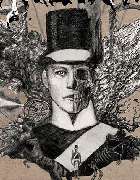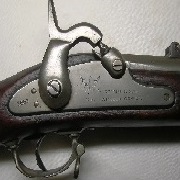|
13th KRRC War Diary, 22nd May 1918 posted:The training continues. 13th KRRC War Diary, 23rd May 1918 posted:Training continues. In the evening the Corps Commander lectured to the Officers and N.C.Os of the Batallion down to Section Commanders in a field near the Camp.
|
|
|
|

|
| # ? May 13, 2024 19:10 |
|
SeanBeansShako posted:A cluster gently caress. Just like now really. Do they? I mean if there's no ramparts or they have been breached. The defenders are probably outnumbered and there is no way to control the defensive battle, all the attackers need to do is zerg rush through the path of least resistance. The main difference to me seems to be that now you can control events beyond visual range. Another difference is that the sides used to be technologically on a similar level.
|
|
|
|
True, but improvised fortifications are quite easy to throw up and especially if the environment favors the defender things can be much harder. Revolutionary Era Paris comes to mind for an example.
|
|
|
|
|
SeanBeansShako posted:Both rate of fire and the actual element itself. Pyrrhus of Epirus' death really sells that urban combat has always sucked. Because Pyrrhus was one of those ancient generals who worshiped Alexander, when he tried to take Argos he lead his army in personally and got caught up in the street fighting. He ended up hand to hand with an Argive soldier basically in front of that soldier's house, with the soldier's aged mother watching all of it from the rooftop. So she pried off a roof tile and threw it at Pyrrhus, which knocked him off his horse, broke his spine, and probably killed him outright (a Macedonian soldier who was nearby cut his head off to make sure).
|
|
|
|
student: "Napoleon staged war on places to help france." me: 
|
|
|
Comrade Gorbash posted:Yeah, literal fires is what I meant. Even outside of the first world modern cities tend not to catch fire nearly as easily as back then, plus the contents of your average home and the equipment of your average combatant are less likely to start fires unintentionally as well. I mean parts of Hougoumont were on fire during the latter part of the battle. Sadly this sucked for not only the men fighting but the men too hurt to continue to fight as they burnt to death in the barn  . .
|
|
|
|
|
A guy at Waterloo survived 52 sabre cuts, 2 gunshot wounds and was grazed by a cannon ball He passed out from blood loss and continued fighting after waking up
|
|
|
Phi230 posted:A guy at Waterloo survived 52 sabre cuts, 2 gunshot wounds and was grazed by a cannon ball I've head of men of iron, but that man both had both too much and not enough iron in him. Yes I know musket balls are made of lead.
|
|
|
|
|
It's actually quite surprising how not-fatal sabre wounds were. In Egypt, aMamluk tried to behead a French soldier, but the sword missed the neck and glanced off the head. A large portion of the The man's scalp dangled from his head but he continued fighting
|
|
|
|
Phi230 posted:It's actually quite surprising how not-fatal sabre wounds were.
|
|
|
|
That man survived the battle to die of the plague later. I am sure that is the one time Napoleon will drop everything and rush straight home for politics guys!
|
|
|
|
|
Phi230 posted:A guy at Waterloo survived 52 sabre cuts, 2 gunshot wounds and was grazed by a cannon ball I'm trying to imagine being "grazed" by a cannonball. Surely that would mess a human being up in a variety of ways.
|
|
|
|
Tree Bucket posted:I'm trying to imagine being "grazed" by a cannonball. Surely that would mess a human being up in a variety of ways. at the very, absolute, least, its gotta be one hell of a bruise
|
|
|
|
It depends really. Sometimes you get a nasty bruise. Sometimes it hits the hand guard of your sword and mutilates your hand to one finger and sometimes it smashes your rib cage and detaches it from your spinal column.
|
|
|
|
|
SeanBeansShako posted:That man survived the battle to die of the plague later. I'd take death by angry Egyptian every time TBH.
|
|
|
|
This is more denazification history (or rather the lack of it) than military history, but it's nonetheless pretty interesting and I thought it would fit best here. The Schützen ('marksmen') of Tyrol can be traced back to the middle ages, when the peasants of the area got both representation in the Tyrolean diet and the right to carry weapons; this would later evolve into the "Landlibell" of 1511, in which Emperor Maximilian granted Tyrol the right to maintain a permanent militia whose principal purpose would be to protect Tyrol during times of war. When the double monarchy of Austria-Hungary fell in 1918, the Schützen lost their military prerogatives and turned into a larger movement of local veterans' associations and from there on into folklore groups focussing on keeping their centuries-old tradition alive. Both in the Austrian north and the Italian south of Tyrol, the Schützen are a vital part of local tradition and folklore and also wield quite a lot of political power; it is said that no Tyrolean politician would ever survive standing against the Schützen and their demands (even though it is also said that in any given Tyrolean village only those enter the local Schützen association who are too dumb to play music and too slow to join up with the local volunteer fire brigade); this is probably an important part of why both Tyrols are strong bastions of Catholic conservative politics with neither having had anything else than a conservative government since 1945. For a group that's so deeply concerned with history and tradition, the official Schützen chronicles turn weirdly tight-lipped when it comes to the years 1938-1945 in the north and 1943-1945 in the south, however. As late as last August, the official history of the Zaunhof Schützen stated „During the war years 1938 [sic] - 1945, Adolf Hitler banned all clubs or associations, and so the Schützen too had to cease", while their comrades in Achenkirch claimed that "[a]fter the invasion of Germany, the Schützen get banned in North Tyrol as well; the carrying of flags, weapons or the traditional Schützen clothing becomes illegal. Many of said flags and clothes get destroyed, while many Schützen groups continue to exist underground". And it definitely seems believable at first - the Nazis disliked everything that didn't neatly fit into their own political and ideological structure, and their Italian fascist kin had made any kind of Schützen activity illegal in South Tyrol as early as 1922. Well, except...  Hitler with the Schützen of Imst, 1938  Schützen in Innsbruck, 1939  Gauleiter Franz Hofer meeting with representatives of the Volders Schützen, date unknown  Schützen parading through the streets of Brixen, 1944 Hmmm  Yes, as it turns out the whole narrative of the proud Tyrolean Schützen continuing to defend their Heimat against any foe and in this case the Nazis who would brutally suppress their old tradition is complete bunk. The Nazis were actually quite happy to instrumentalise an existing tradition if it fit into their ideas of racial purity and German fondness of their home, and the Catholic background of the Schützen was nothing more than a thin veneer, quickly discarded once it became opportune to do so. No wonder then that among the first things the Nazis did after annexing South Tyrol in 1943 was to reinstate the Schützen and make them part of the military defence plans they had set up for the area. Denazification was woefully inadequate in Austria and virtually non-existent in South Tyrol. At both sides of the Brenner, the Schützen came quickly to the conclusion that forgetting was the preferrable option here, and on top of that the bald-faced lie of Schützen having to go underground in face of the Nazi onslaught emerged soon afterwards, a lie which was probably also propagated by the many Nazis that took on leading offices in various Schützen groups after the war, like e.g. August Pardatscher, secretary of the South Tyrolean Schützen union who had been one of Tyrol's highest-ranking SS officers.  Pardatscher (right) in Kaltern, 1958. He wears two iron crosses on his uniform as well as the close combat clasp in silver which was awarded for 25 instances of successful hand-to-hand fighting in close quarters. Next to him is Alois Pupp, governor of South Tyrol, commander of all South Tyrolean Schützen and also a former NSDAP member. The Schützen only started to acknowledge their difficult past during the last five years or so. Well, when I say "acknowledge", I mean "ask a historian with a long history of writing romanticised depictions of Tyrolean history to write a history of the Schützen under Hitler and then do absolutely nothing afterwards". The book was supposed to come out in 2015 but never saw the light of day, so I guess that not even a Schützen-friendly historian like Michael Forcher was able to whitewash the whole affair enough to publish it. The Schützen aren't the only part of Tyrolean society that studiously avoided confronting its own Nazi past. Just a couple of years ago there was a (minor, as almost all media in Tyrol are closely connected to the government) scandal when the government of North Tyrol was shown to spend a lot of money honouring the memory of Tyrolean composers whose connections to the Nazi regime ranged from "conflicted" to "literally said that they want to kill all Jews". The latter composer, Joseph Eduard Ploner, was even called "the ideal Tyrolean" by the government-financed Institute for Tyrolean Musical Research. And one of Tyrol's most famous alpinists, the legendary Gunther Langes, was an SS member and a fanatical Nazi; in 1943/44 he led the Bozner Tagblatt, the only daily paper allowed by the Nazis in South Tyrol which was just full to the brim with war propaganda and really nasty anti-semitic stuff, but you would be hard-pressed to find much about that in German anywhere. Try his German wikipedia article: quote:During the Second World War, Langes, editor-in-chief of the Bozner Tagblatt, was considered a collaborator with the Nazi regime. For example, he was involved in the special mission "Claretta", which aimed at communication between Benito Mussolini and [his lover] Clara Petacci, who had been separatedat the time. On the other hand, Langes is said to have helped an Italian mountain guide, threatened by persecution by the Nazis, to flee to Switzerland. That's literally all the German wikipedia has to say about Langes during that time. Contrast the (sadly unsourced, so take it with a grain of salt) Italian version: quote:At the outbreak of the Second World War, like many German and Austrian of his age, Langes was called up to serve in the territorial militia of the Wehrmacht. From September 1943 until August 1944, he was editor-in-chief of the Bozner Tagblatt, the only German-language daily of clear pro-Nazi inspiration, published in Bozen until May 1945. In the summer of 1943, at the fall of Fascism [in Italy], he became the trusted interpreter of General Josef Dietrich and then of the SS commander in Italy, Karl Wolff. He was entrusted with the delicate mission of creating a channel of communication between Benito Mussolini and Clara Petacci who, after her release from Novara prison, had moved to Merano with her mother, father and sister. In October 1943 he organized, together with Wolff, the first stealthy meeting between Mussolini and his lover, at Villa Feltrinelli, which had become the seat of the Italian Social Republic a few weeks ago.  A viciously anti-semitic article out of the Bozner Tagblatt issue of September 21st, 1943. The highlighted bit at the end reads: "The Führer has him [=Chaim Weizmann, a well-known zionist] and all Jews already given the reply that the result of this war will be the annihilation of all Jewry." At least online you won't find any mention of the nasty stuff Langes' newspaper put out on a daily basis. I'll end this post with a funny tidbit I found: One of the composers honoured by the Tyrolean government was Sepp Tanzer, whose marches are still widely played by brass bands throughout Tyrol. This is Sepp Tanzer (crossed arms) with his musicians in 1943:  And this is literally the same troupe three years later (look at the flags):  
System Metternich fucked around with this message at 01:51 on May 24, 2018 |
|
|
Vincent Van Goatse posted:I'd take death by angry Egyptian every time TBH. Seriously being a garrison of what was left of that army stranded and dying just sucked.
|
|
|
|
|
That reminds me, I've been listening to the Revolutions podcast, and a thing that keeps up coming up again and again is the idea of the National Guard, which I never fully get. I'm not exactly sure what the purpose of a National Guard is supposed to be, France has one that keeps getting involved in political machinations, then in the revolutions of 1848, in so many of these groups of people clamoring for all sorts of liberal reforms and whatnot also want to form national guards as part of their demands like it means something important, and I'm not really sure what it means? Louis Philippe calls the national guard on the French Revolution of 1848 when a mob comes to depose him, but isn't willing to call in the proper army as if somehow there's some kind of legitimacy distinction between the two, and the french national guard seems to have like a 50/50 chance of actually doing something when they're called upon anyways, so what's the deal with that? Sorry if this seems too beep boop cultural norms do not compute,
|
|
|
|
SlothfulCobra posted:in so many of these groups of people clamoring for all sorts of liberal reforms and whatnot also want to form national guards as part of their demands like it means something important, and I'm not really sure what it means? professional soldiers are scum and worse than scum, probably joined up for drink. you not only hate them, because it's not the 17th century any more you don't even fear them. The worst thing for people who fetishize the People like this is actually meeting any of them. until the 1870s, when the national guard are probably all commies. 1870s france was p wild.
|
|
|
|
Yeah you gotta remember that the French only get a National Guard force in 1789, and you know exactly what sort of stuff was already going down by that time. And consider that the original name the group was founded under was the "Bourgeois Militia" before being renamed to the National Guard within days, which is a pretty good indication of the sort of role they'd hold for much of the 19th century, even though they spent plenty of time being forces of the entire public - naturally they spent much of the height of the Revolutionary period lead by decided leftist radicals before Napoleon et al would gradually drain the powers they had and reduce the membership back to the wealthier middle class. So when you're someone in like Germany who wants to bring about a constitution and some manner of representation for people like you, well of course you're going to say you want a National Guard like France (and probably hastily emphasize something to the effect of 'oh not a 1793 national guard that's just too far'). There's a certain amount of the fact that National Guard units were mostly used for things like garrisoning and protecting state property and buildings that used to be guarded by soldiers of the normal army, that builds into a view that a Guard means you as the successful shopkeep are both proving your usefulness to the state and also showing that maybe you get to defy the rulers a bit because you are accountable to your friends and business partners, after all.
|
|
|
|
the fact that they're not super great at war is glossed over, just like machiavelli's call for a citizen militia did
|
|
|
|
Yeah, basically the National Guard was the less formalised, less historical army that thus had a great deal more liberals and leftists since they were less strict about keeping those kind of people out. The French army had more of it's support from the peasantry, who were less political, while the National Guard recruited more from the towns and cities, and Paris especially. They were called out by the tocsin, which apparently was some sort system of bells. What's more, it came from the French revolution (probably one of the most important events in human history that needs to be far more covered in school internationally), so it's affected by all the feelings and memories of that. Combined, they tended to have a great deal of influence upon the political situation (and the military one) in Paris, which for the 18th century was kind of a weird bellwether for the whole country, where the cities tended to follow and the countryside tends to oppose it. Not with exactness, but still. Much like you said, they tended to be more selective when they came out, so there's not much a dictator can do without some popularity on the streets. Ardent Communist fucked around with this message at 05:13 on May 24, 2018 |
|
|
|
HEY GUNS posted:the fact that they're not super great at war is glossed over, just like machiavelli's call for a citizen militia did The US tried to make "a militia but with boats" before the war of 1812 because Thomas Jefferson's crowd were terrified of the concept of any standing military force, imagining the federalists sending boats of heavily armed sailors and marines to attack rebellious states, and it went about as well as you'd expect. Ian W. Toll's "Six Frigates" posted:The gunboats were never popular with the Federalists, who regarded them as poor substitutes for frigates and ships of the line. On September 8, 1804, during a “dreadful Storm,” the first American-built gunboat was driven from her moorings off Whitemarsh Island, Georgia, and landed high and dry in a corn field. She lay there, stranded, for almost two months. The Federalist newspaper Connecticut Courant gleefully commented that the gunboat might, if left in the field, “grow into a ship of the line by the time we go to war with Spain. Should this new experiment in agriculture succeed, we may expect to see the rice-swamps of Carolina and the tobacco fields of Virginia turned by our philosophical Government into dry-docks and gunboat gardens.” quote:As the first gunboats were launched and placed in service, criticism mounted. They were wet, cramped, and uncomfortable. It was often difficult to recruit full complements of seamen to man them. Officers took the first opportunity to be transferred into a frigate. When a Norfolk gunboat cap-sized and sank in six fathoms of water, Stephen Decatur dryly asked a fellow officer: “What would be the real national loss if all gunboats were sunk in a hundred fathoms of water?” Defense procurement is eternal.
|
|
|
|
HEY GUNS posted:the fact that they're not super great at war is glossed over, just like machiavelli's call for a citizen militia did The truest military service is to make sure the city hall of Toulouse is never sullied by vile foreign boots! 
|
|
|
|
C.M. Kruger posted:The US tried to make "a militia but with boats" before the war of 1812 because Thomas Jefferson's crowd were terrified of the concept of any standing military force, imagining the federalists sending boats of heavily armed sailors and marines to attack rebellious states, and it went about as well as you'd expect. this is absolutely fantastic
|
|
|
|
Machiavelli's idolisation of the "citizen soldier" makes me think he just wanted to cargo-cult the Romans.
|
|
|
|
They will learn to fear our sloops, our yawls, and most of all, our deceptively large canoes.
|
|
|
|
I remember from listening to Revolutions that the armies garrisoning the various corners of the Austrian empire were explicitly not locals and often didn't even speak the local language. I can see how that may have been kinda offputting for any nationalist radicals around.
|
|
|
|
Nice effortpost about Tyrolian Nazi's, it always seemed odd to me that Germany eventually had a clearing ofcthe house but Austria never did.
|
|
|
|
|
C.M. Kruger posted:The US tried to make "a militia but with boats" before the war of 1812 because Thomas Jefferson's crowd were terrified of the concept of any standing military force, imagining the federalists sending boats of heavily armed sailors and marines to attack rebellious states, and it went about as well as you'd expect. Gunboats used in support of other ships could be useful, (see: https://en.wikipedia.org/wiki/Battle_of_Svensksund) but to replace an entire fleet? What an idea.
|
|
|
|
Xarbala posted:They will learn to fear our sloops, our yawls, and most of all, our deceptively large canoes. It's not every day the international situation requires a showing by our armoured punts!
|
|
|
|
Gort posted:Machiavelli's idolisation of the "citizen soldier" makes me think he just wanted to cargo-cult the Romans. Doesn't that pretty much describe the Renaissance in general?
|
|
|
|
Tomn posted:Doesn't that pretty much describe the Renaissance in general? Not universally. If you look at Paracelsus for example, he famously burned the works of Roman-era physicians like Galen and denounced the theory of the humours proposed by Hippocrates. It wouldn't have been much of a renaissance if they all just read and regurgitated classical works.
|
|
|
|
There's a fun depiction (ignoring the magic) of the defence of Hougoumont in the BBC adaptation of Jonathon Strange and Mr Norrel. https://www.youtube.com/watch?v=WUtDkfHlzgs It takes a couple of episodes to get going, but the whole series turned out to be great I thought. The French officer who breaks in and goes all Conan the Barbarian with his axe is actually based on a real person, one Sous-Lieutenant Legros.
|
|
|
|
Ataxerxes posted:Gunboats used in support of other ships could be useful, (see: https://en.wikipedia.org/wiki/Battle_of_Svensksund) but to replace an entire fleet? What an idea. Well to be honest they did thing during the Revolutionary War and the Civil War as well...
|
|
|
Deptfordx posted:There's a fun depiction (ignoring the magic) of the defence of Hougoumont in the BBC adaptation of Jonathon Strange and Mr Norrel. NO OPENING BIT GO BACK ZOOM IN ZOOOM IIIIIN!
|
|
|
|
|
Xarbala posted:They will learn to fear our sloops, our yawls, and most of all, our deceptively large canoes. Obligatory: 
|
|
|
|
Deptfordx posted:There's a fun depiction (ignoring the magic) of the defence of Hougoumont in the BBC adaptation of Jonathon Strange and Mr Norrel. Well, I mean its all very dramatic, but I don't think that battlefield magic is going to carry the day. Sure, it can be helpful, but ultimately, wars are won by logistics, not by sorcery.
|
|
|
|
The real hero is the handful of men constantly braving that gauntlet outside to keep getting crates of cartridges to the men.
|
|
|
|
|

|
| # ? May 13, 2024 19:10 |
|
sullat posted:Well, I mean its all very dramatic, but I don't think that battlefield magic is going to carry the day. Sure, it can be helpful, but ultimately, wars are won by logistics, not by sorcery. To be fair to logistics and sorcery, good logistics can look like absolute wizardry as in "how the gently caress did they know we were gonna need all these spare axles?" when your surveys and intel make note of insanely rough terrain/unimproved roads and you plan to supply your beachhead accordingly.
|
|
|


































